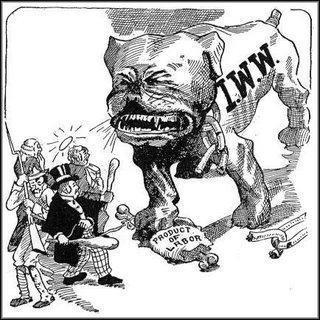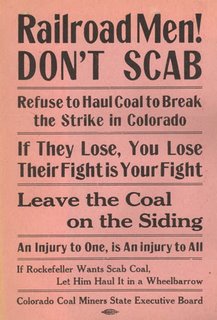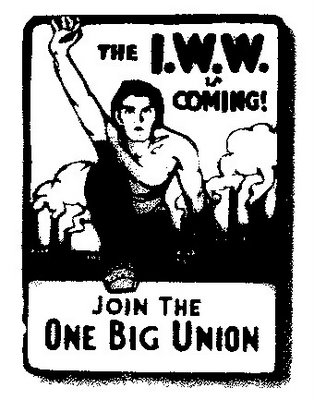
I am still puzzled (though no longer surprised) by how often workers identify with their bosses' interests instead of their own. Union meetings are spent on back-biting, complaints against other union members and fighting over crumbs, while the CEO still takes the biggest piece of cheese.
Administrative executives are given car allowances, golden parachutes, retirement packages, arbitrary power-- and they fight tooth and nail against every pittance that might be spent on the business instead of themselves. This is supposed to be evidence of the Invisible Hand: the marketplace wouldn't be paying CEOs these high salaries if they weren't worth it. Forbes reports in April of 2005 that "the heads of America's 500 biggest companies received an aggregate 54% pay raise last year. As a group, their total compensation amounted to $5.1 billion, versus $3.3 billion in fiscal 2003."
Never mind workers' wages-- I'd settle for investment in infrastructure, in an improved work environment. It was a mistake when workers took cash instead of a seat on the board. We traded a boat in the driveway for our birthright.

Why don't working people laugh out loud at the annual call to abolish the estate tax? Only about 2% of all estates will ever be subject to the tax. "Death tax", the Republicans are intructed to call it, as though the IRS were taxing the right to die.
Years ago, I asked Doc Clark why so many people were eager to turn against each other to do favors for the powerful. "I guess people like to hang out with rich people; they think some of it might rub off on them," he said. Maybe that's part of it: a desire to curry favor, like the knights who murdered Beckett because they thought it would please the king. In the feudal south, my father remembers poor whites defending the landowner's interests against black sharecroppers, though the crackers would never see a dime themselves.
I've seen a head waiter tyrannize the wait staff because he thinks he owns the restaurant. Imagine his disappointment when the owners pass him over in favor of a relative.
 There's some kind of class-warfare version of the Stockholm syndrome going on, where the captive over-identfies with the kidnapper instead of his rescuers.
There's some kind of class-warfare version of the Stockholm syndrome going on, where the captive over-identfies with the kidnapper instead of his rescuers.In 2001 the top 1% of households owned 33.4% of all privately held wealth. The next top 19% held 51%. That leaves (let me take off my socks, so I can count on my toes) 15.6% for the rest of us to fight over.
You probably know the stories of outrageous compensation for administrators and executives, the examples of waste better than I, and yet it's union members who are attacked in ads sponsored by something called The Center for Union Facts out of Washington, D.C. -- as if the employees had a voice in spending priorities or work conditions! Thus the Chamber of Commerce shows its true colors.
American workers fantasize that they have more in common with their employers than with other working stiffs. They haven't learned that even though you love your job, the job does not necessarily love you.

The collapse of Ford and GM under the weight of the health care system might knock some sense into us. The New Yorker has a remarkably clear piece on something called the"dependency ratio" that explains what's really going on when a company can't keep its promises to its workers, why China, India and even Ireland are outpacing us.
Instead of letting workers invest in a centralized health care and pension fund, the big corporations insisted on private funding for their employees. Now, after decades of improvements in manufacturing and a growing pool of retirees, there are fewer workers than there are dependents. Simply put, our old fear of socialism is catching up to us.
As Malcom Gladwell puts it: "This crisis is sometimes portrayed as the result of corporate America’s excessive generosity in making promises to its workers. But when it comes to retirement, health, disability, and unemployment benefits there is nothing exceptional about the United States: it is average among industrialized countries—more generous than Australia, Canada, Ireland, and Italy, just behind Finland and the United Kingdom, and on a par with the Netherlands and Denmark. The difference is that in most countries the government, or large groups of companies, provides pensions and health insurance. The United States, by contrast, has over the past fifty years followed the lead of Charlie Wilson and the bosses of Toledo and made individual companies responsible for the care of their retirees. It is this fact, as much as any other, that explains the current crisis. In 1950, Charlie Wilson [the CEO] was wrong, and Walter Reuther [the union guy] was right."

It was the bosses that shot themselves in the ass. And Joe Hill, God bless him, has the last grim laugh.
 (And some days it takes more Stones than others...) Where Mythical Bestiary meets Contemporary Culture and Chews On Its Leg Until Covered with Slobber.
(And some days it takes more Stones than others...) Where Mythical Bestiary meets Contemporary Culture and Chews On Its Leg Until Covered with Slobber.
1 comment:
Pat thought you would be interested in this story:
NPR : International
Workers Songbook Gets Big Update
This message was included:
Hope you heard this. If not, give it a listen. Happy Labor Day and
thanks for an excellent blog entry.
Post a Comment